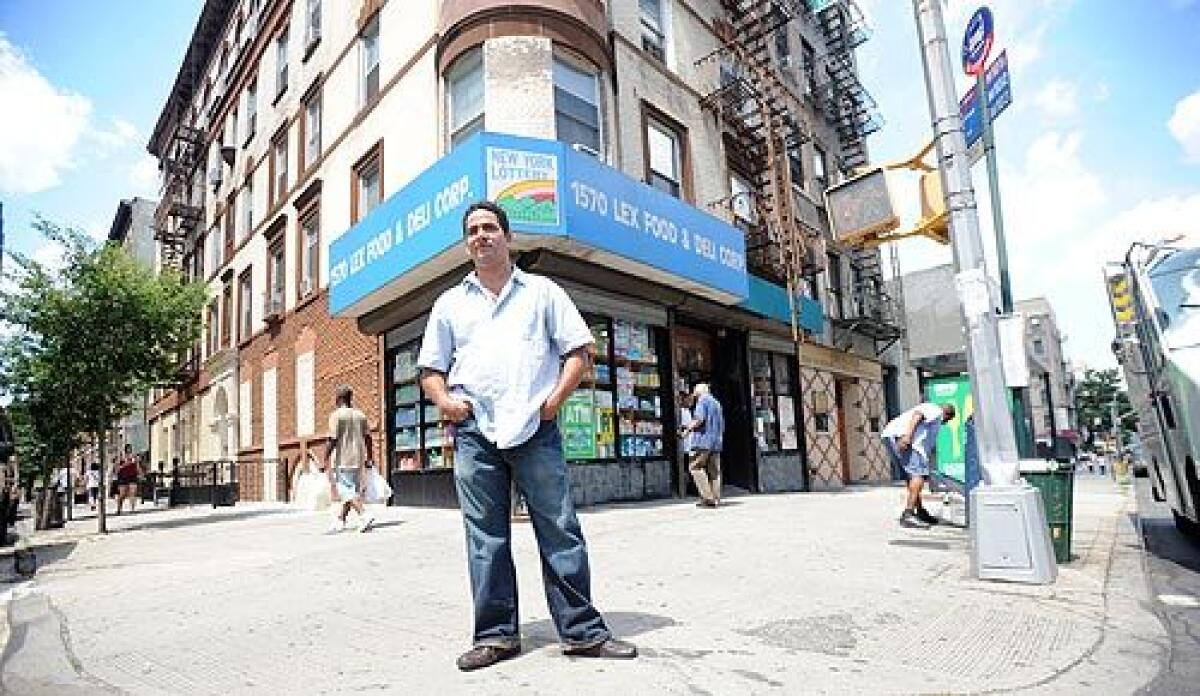The New York bodega fights for its life

The 7 a.m. sun gleams off the windows of this East Harlem bodega, as its owner, Julio Pimentel, unlocks the door and steps behind the counter that separates him from customers. He switches on a fan and tunes the radio to a Spanish station, and merengue awakens the humid morning.
It is Friday, Aug. 1. Rent is due, and Pimentel does not know if he can pay. He spends $3,300 a month to lease the bodega. When he took over the small grocery eight years ago, monthly rent cost $1500.
Pimentel surveys the shelves. He’s running low on popular items: grape-flavored Kool-Aid mix, Goya honey, Starbursts, Cheez Doodles, applesauce, sunflower seeds.
Food prices have gone up, and his customers don’t spend as they used to. Pimentel pays more for goods but won’t raise his prices. He knows his clientele can’t afford to pay more. They are mostly poor residents from the housing projects, shelters and run-down apartments in the neighborhood. Recently, a woman scoffed at the 99-cent price for a bar of soap, walking out in a huff without buying. Nearly everyone is struggling more than usual.
Across the city, a food crisis is unfolding in low-income neighborhoods, as one-third of New York’s supermarkets have closed over the last five years, according to a recent city report. Most New Yorkers don’t own cars; having a nearby store is important when grocery shopping means traveling by foot, cab or subway. Well-to-do residents who don’t live near a supermarket can pay extra to order groceries online and have them delivered; poor residents must turn to the closest bodegas.
“The sales have been down for the last nine months,” said Jose Fernandez, president of the Bodega Assn. of the United States, which claims membership of 7,800 of New York’s 11,400 bodegas. A weakening economy and rising rents and food prices have forced many to close, he said; the number of bodegas in New York has decreased by nearly 1000 from two years ago, according to his organization’s most recent tally.
For decades, bodegas -- the crowded corner stores started by Puerto Rican and Dominican entrepreneurs in the 1960s and 1970s -- have textured the backdrop of New York. The Spanish word comes from bodeguita, a general store in Latin America, and has come to refer to such New York shops owned by people of all ethnic backgrounds.
In the last decade, many Latino longtime shop owners have left to open bodegas in places like Pennsylvania, Rhode Island or Connecticut, or moved on to bigger businesses, passing their shops to other immigrant groups, including Koreans, Middle Easterners and the newest wave of Latino immigrants, Mexicans.
Pimentel, a Dominican immigrant, is trying to hang on.
“It’s hard. I think it’s going to be worse for New York,” Pimentel says, adding, “People are looking for special prices. Sometimes bodegas can’t give special prices.”
His shop, Lexington Avenue Food & Deli Corp., sits at a crossroads where condo developments and pricey outdoor cafes end and low-income housing projects and check-cashing businesses begin.
The bodega is slightly bigger than a dine-in taco stand. It fits three aisles of goods stocked according to no apparent sorting system: guava jelly, coconut milk, Wonder Bread, Goya beans, mango juice, Juicy Juice, cactus plants, blackened bananas, pork rinds.
On the shelves near the front and side windows, light peeks between rows of “Nice ‘n Fluffy” and Suavitel fabric softeners and VO5 Sun-Kissed Raspberry shampoo.
Toilet paper, masking tape, plastic toy dolls, paintbrushes and barbecue lighters fill wall space, reaching high as the ceiling.
Pimentel’s counter stands next to the entrance. To the right of it is the deli, where the scent of fried eggs, ham and flaky dough makes morning stomachs rumble.
Pimentel, 50, is a quiet man with thick eyebrows black as his hair. He’s stationed behind clear plastic shelves filled with peppermints and chewing gum. The space is so narrow that when two people are behind the counter, they must shimmy by each other.
Behind him, a shelf is crammed with Advil PM, flashlights, cigars, Fixodent, Midol, a moldy package of coffee cake, canned octopus in garlic, Vienna sausages, toy guns, a Puerto Rican flag, $2 calling cards that read “Conversacion.”
Pimentel serves customers through an opening wide as a window. His bodega does not have bulletproof glass -- he believes his camaraderie with the community is enough to keep him safe from armed robbers, though not necessarily from shoplifters.
Pimentel owes $1,400 to the power company and $1,300 in rent for the Bronx apartment he shares with his wife.
They have other debts, too. He has saved money to pay some of these bills, but it’s not enough to cover the bodega rent, too.
To pay on time, he’ll need to earn $3,300 today.
If he keeps falling behind, Pimentel says, the debt could mount until it swallows him. “I will have to close. I have no option. I lose all the money that I have.”
‘Good morning. Today is Christmas, Christmas for all of us,” jokes a scraggly bearded man with a raspy voice. His name is Willie. “We get paid today.”
For the last several years, Willie, 49, has hung around Pimentel’s bodega, arriving promptly when it opens and staying through the afternoon. Wearing a Mets cap, he sweeps floors, flattens boxes, unloads deliveries, moves Pimentel’s car during street cleaning hours, and feeds the store cat, Matsui. Willie won’t accept money for his work, so Pimentel gives him food.
No one knows Willie’s last name, and he refuses to tell.
Willie is right about today: Welfare and payday checks are distributed. For the last week, customers have stretched dollars from their Electronic Benefit Transfer cards (food stamps), or paid in nickels and pennies, or asked for store credit. Today they will come with cash, checks, smiles. Pimentel thinks sales might be good today.
“How much is a small coffee?” asks a woman buying her son an empanada.
“Sixty cents,” says Pimentel.
“Wow, enough for everybody,” she says. “I want another ham and cheese.”
The empanadas have become a hit. Three months ago, Pimentel and his wife, Lorenza, 50, decided to sell them to try to make up for the slumping sales and rising costs. Most nights, after Pimentel gets off work, he helps his wife fill more than 100 empanadas with chicken, beef or cheese. They sell for $1 to $1.50 each. By midday, Lorenza will arrive with more trays.
Nearby, Frank Soto, Pimentel’s friend, makes hero sandwiches. Pimentel pays Soto $9 an hour to run the deli. Soto has worked for him since 1989, and he is one of the few people Pimentel trusts.
His 24-year-old son, Vicente, says that a few years ago, an employee of Pimentel’s stole nearly $40,000 from a lotto machine in the bodega. Now Pimentel is stuck paying the debt. He no longer sells lotto tickets.
Pimentel works fast, tapping prices into his register, taking phone orders for egg and cheese sandwiches, keeping an eye on three security screens in front of him, stuffing brown paper lunch bags with soda, candy, cups of coffee for his customers.
Behind him hang six sets of keys. They belong to neighborhood residents who keep their spares at the bodega in case they get locked out of their homes or family members need to get in.
The sales trickle in. One pack of Advil: $1. Two AA batteries: $1. Soda and a ham and Swiss sandwich: $5.44. Five gummy fish: 25 cents.
“Buenos dias,” says a customer buying a bottle of Corona beer. It’s just past 8:30 a.m. Pimentel has made about $120.
A woman enters lugging a smudged white laundry basket, which she sets down in the middle of Pimentel’s checkered floor and begins to scrub furiously with a paper towel. “I hope someone will give me $5 for it,” she says, nodding to the customers coming in and out.
Pimentel lets her hawk the basket in the middle of the morning rush inside his store. He has a hard time being rude and an even harder time saying no. Just ask his four sons.
Their father, they say, is also an excruciatingly honest man. “For him, being so nice, it doesn’t work in this business,” says Vicente. “He’s the most selfless person I ever met in my life by far. Hence the problems.”
When New York cigarette taxes recently jumped, Pimentel could have resorted to selling single cigarettes illegally, as many shop owners do. Few of his customers will pay $9 for a pack. But Pimentel would not break the law, so he stopped selling cigarettes. Now bills and receipts fill the overhead trays once stocked with Newports and Marlboros.
Two days ago, a neighbor brought in a tray of homemade bread pudding, urging Pimentel to sell slices. Pimentel didn’t think anyone would buy, but he gave the man $20 for it anyway. Now the bread pudding lies on his counter next to the beef jerky sticks, soggy in the 90-degree heat.
Sales pick up. Pimentel switches the station. Lionel Richie’s song “Hello” plays, and Pimentel sings along while ringing up customers.
A man slaps a welfare check on the counter and walks through the aisles. The check is good for: One and a half dozen eggs. One can of juice. Two gallons of milk. “Not to exceed $17.30,” it reads.
By 9:25 a.m., Pimentel’s sales are up to $300.
A delivery arrives: 10 cases of beer. Pimentel pays the vendor $167.95.
Pimentel took over his first bodega in 1985, on 107th Street and Columbus Avenue. He knew the business model because his father ran a bodega in the Dominican Republic. Pimentel paid $600 a month in rent, and sales boomed.
“Every week, I put $1,500 in my pocket,” he remembers.
But over the next few years, rent jumped to $1,500 a month. Pimentel couldn’t afford it anymore. He left, and later opened the East Harlem shop where, until three years ago, earnings were decent. Then everything started going downhill.
Billy Le Roy, 43, hangs around Pimentel’s shop every day. He worries about whether Pimentel’s shop will survive. “He can’t keep simple things, like V-8. It costs too much,” Le Roy says.
Across the street sit a gleaming Italian restaurant and the Joy Burger Bar, which sells veggie and turkey patties and charbroiled beef in pesto, spicy mango chutney and sweet chili sauces. The burger bar used to be a bodega, Pimentel remembers, but the owner, also a Dominican, left a couple of years ago when rents began to rise.
Looking over there, Pimentel notices a reddish-blond-haired man wearing a pink headband. “That’s called punk style,” says one of his customers. The men inside the bodega laugh.
Around the neighborhood, half a dozen bodegas and groceries sits vacant with signs still posted: Stop 1 Deli and La Malinche. A Compare Foods supermarket with Puerto Rican, Dominican and American flags painted on its doors is padlocked.
For years, Pimentel’s sons have tried to persuade him to upgrade -- add fresh-squeezed juices, fruit shakes and organic brands to appeal to newer residents who have more money. “We tell him every week, ‘You have to raise prices,’ ” Vicente says. “He doesn’t want to. He has his clientele.”
Just after 2 p.m., Vicente and his brother Harry, 27, stop by the bodega to check on their parents.
Like all four sons, Vicente helped run the store growing up. He leans against the counter, slapping hands, greeting customers.
A sign above his father’s register warns he does not give credit.
A short, stocky man with missing teeth says hello to Vicente and hands Julio Pimentel a $100 bill. Pimentel reaches for the black and white notebook on a shelf. The handwriting on its cover reads “Moscota de Credito.” Each page has rows of charges, $14.50, $2.30, $9.79, beneath names: Sonia, Blondy, Maria, Lydia, Gigi, Fernando. They are customers who owe Pimentel money.
Pimentel crosses numbers off the man’s bill.
Vicente rolls his eyes. “This guy’s been good lately,” he says. “But they usually aren’t.”
It’s 4:30 p.m., and Pimentel has not sat down for nine hours. His youngest son, Michael, 22, shows up to work the night shift to give his father a break. But sometimes he arrives late, or doesn’t show, leaving Pimentel to work a double shift. He can’t afford to hire more help, and when Michael goes to college in the fall, Pimentel will go back to working 7 a.m. to 11 p.m., seven days a week.
Pimentel steps outside for a cigarette, his first break since he opened the shop today.
He checks the register before leaving. The store has earned about $1,300.
Seven hours later, when Michael closes, earnings are up to $1,785.
But Pimentel spent $2,492 restocking the shelves.
“I spent more money than I made,” Pimentel says the next morning.
He still doesn’t have enough to pay the rent. There is a 10-day grace period.
Pimentel will try again today.
More to Read
Sign up for The Wild
We’ll help you find the best places to hike, bike and run, as well as the perfect silent spots for meditation and yoga.
You may occasionally receive promotional content from the Los Angeles Times.






